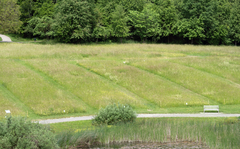What are the effects of mowing practices on insects? [14.07.22]
Hohenheim meadow experiment launched: Two-year study about insect-friendly mowing on the campus of the University of Hohenheim.

For two years, the correlations between mowing methods and insect populations on the Hohenheim campus will be analyzed. The first mowing day started in May this year. (Photo: University of Hohenheim / Helmut Dalitz)
Today, there are significantly fewer insects in our meadows than there were a few years ago. Reduced plant diversity, declining structural richness and intensive mowing are the main causes. Also, many insects are killed by the mowing machines. However, Insects are important for the ecological balance. They are food for small mammals and birds and pollinate many of our food crops.
To protect insects and their habitats and promote biodiversity, botanists and zoologists of the University of Hohenheim are developing sustainable and practicable solutions for different locations and habitats. One idea that has been discussed for several years is to change current mowing practices. Those who mow less and leave flowering strips over the winter, protect meadow wildlife in the long term.
In April, a two-year research project was launched at the University of Hohenheim. Researchers and students from the Hohenheim Gardens and the Institute of Biology want to analyze and statistically prove relationships between the rhythm of mowing, the way mowing is carried out and the plants and insects that occur on more than two hectares of green space on campus.
The Hohenheim meadow experiment is funded by the Bülow Foundation from Leonberg with 100,000 €.
Back to Latest News